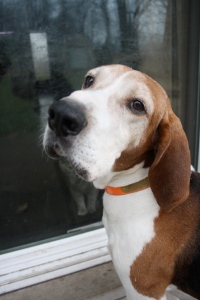My husband and I have been a foster family for a coonhound and beagle rescue on and off for a couple of years. We’ve had six dogs come through our home in those years. Some stay for a few weeks. Some stay for a few months.
We’ve learned so much about our dogs and ourselves by adding a foster to our family. We stopped volunteering for a few months while Wilbur recovered from his autoimmune disease, but then I was diagnosed with ITP earlier this year. We had a couple of very scary months where we were reeling with information. The stress made me feel worse. I knew it was time for another break, because the first lesson of fostering kept returning to my mind.
If you’re stressed, they’re stressed! They’re already having a tough time getting shuffled around, moving out of a shelter or former home, and now they’re meeting new dogs outside of their territory. They can’t speak for themselves. They can’t tell you how lonely and afraid and sad they are to be displaced. When I come home and cry or sleep or vent, I’m not helping them settle in to what I hope would be a calm home. My dogs know me. They give coonhound hugs and cattle dog snuggles when I’m upset. Foster dogs don’t know me yet.
Logistics are important. We have a strict order of who is fed when, where, and in what order. Duey, our current foster, can’t use the dog door. He’s too old and too small for the 90lb-sized dog door. He also can’t handle the steps very well. We have to make sure our dogs don’t bowl him over, eat his food, or pick a fight with him. They’d probably lose to the old man, but I don’t want to try.
A little love makes all the difference. Sit on the floor. Offer a special treat. Take them for a walk. I thought our senior foster beagle would not feel up to walking. Not true. He brightened up and kept up with the young ones. Tonight he continually nudged my hand so I’d scratch his back. He never begs for attention. He usually sleeps. But tonight he wanted me. If I’ve had a rough day, it can feel overwhelming to come home and go through the routine and logistics of getting everyone fed and outside, medicated and bathed, walked and loved. But our foster dogs never fail to show gratitude in their own ways, making up for all the details that go into their care.
Some people ask why we choose to foster, why our rescue doesn’t kennel the dogs until adoption. I might be selfish, but fostering has made me a more patient, observant human being. I have to communicate every day with a family member who can’t form words, doesn’t see well, and barely gets up and down the steps. He’s teaching me patient love just as much as I’m teaching him good house manners. He will know my love now so he can better know someone else’s later.
Have questions about fostering? Are you interested in being a foster dog parent? Reach out to me or look up a rescue near you. Many of them would be happy to talk to you about volunteering.



